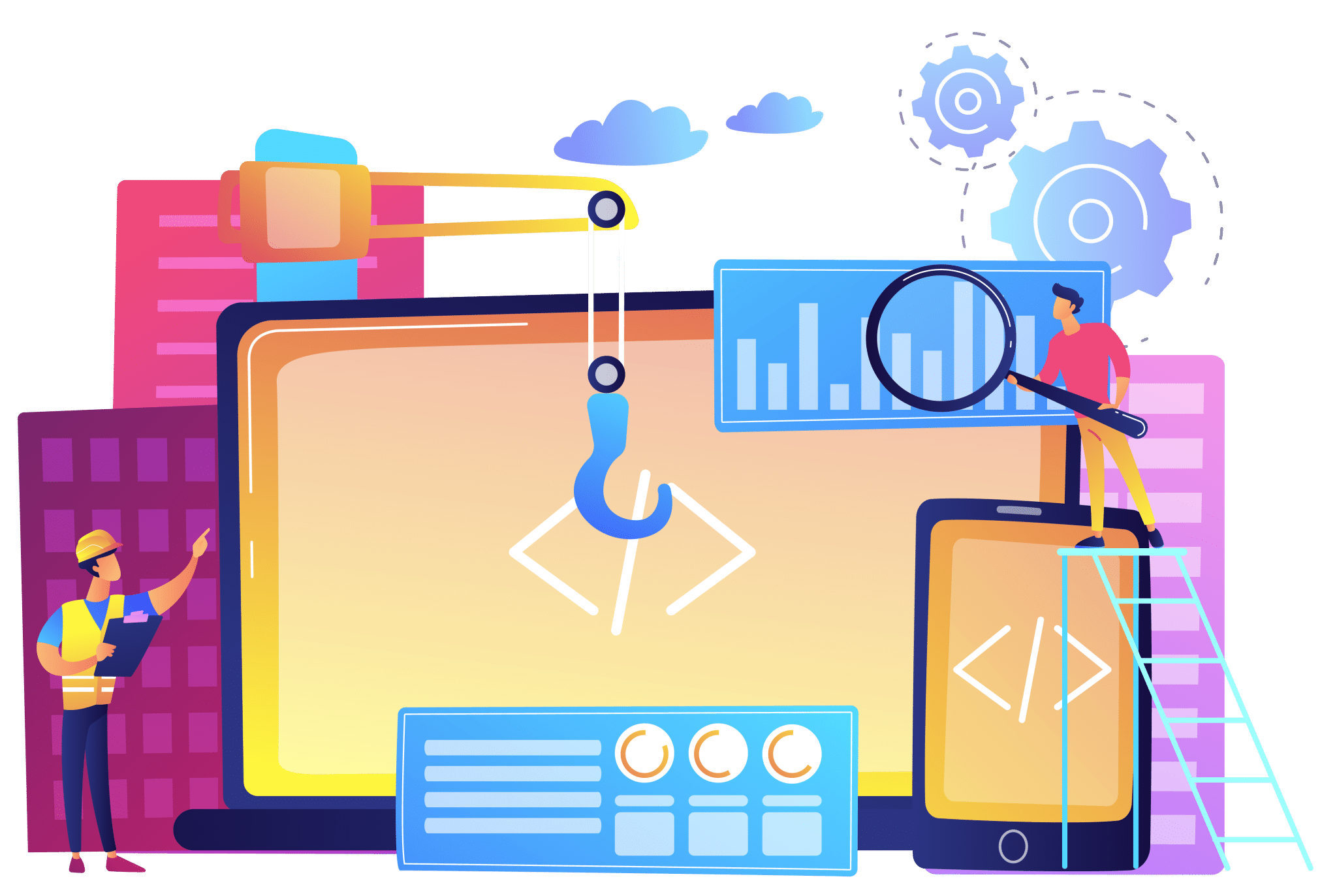Table of Contents
ToggleBusinesses are facing the fourth industrial revolution with the latest technologies and scientific advancement, specifically after Artificial Intelligence and Digitalization. None of the sectors are left indifferent since the arrival of ChatGPT and Gemini, let alone chatbots and machine learning. Real Estate, being one of the major US industries, is also evolving with the transformative diffusion of cutting-edge technologies. Changing customer needs and shifting demands also forge the path for the advancement in real estate software, propelling proptech software.
We will discuss proptech meaning, types, features, real estate evolution, and proptech trends in the following sections. In addition, we will cover the services of Unique Software Development as the best custom proptech development company. The blog will answer queries pertaining to the future of custom real estate software development for readers, agents, and investors.
What is Proptech Software?
Proptech software, or simply proptech, is the term that unifies two different words as a modern name. The word ‘Prop’ refers to property, while the word ‘tech’ refers to technology, indicating that proptech means property technology. However, the real proptech definition is a modern software or technology that facilitates the management of Real Estate projects or assets.
Proptech software is in no way different than old real estate software, besides having the latest features and modern technologies. They help in buying, selling, managing, maintaining, or leasing properties, including accounting, brokerage, and profitability analysis, using the software. The term became famous after venture capital investments in the domain rose to a whopping $32 billion in 2021. Let’s analyze its different types before exploring the key features.
Different Types of Proptech Solutions
Property technology encompasses a wide range of solutions aiming at enhancing various aspects of the real estate industry. Here are the common types of Proptech solutions based on their purpose or user category.
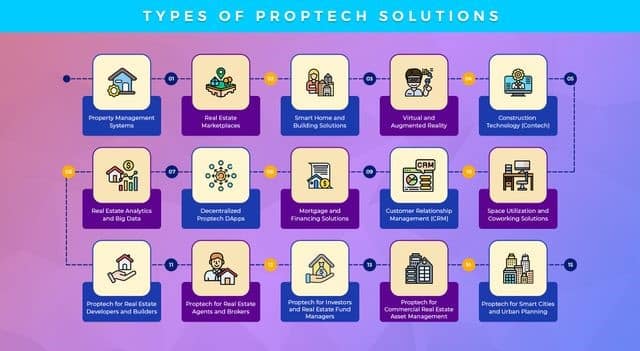
1. Property Management Systems
Diverse property management systems enable owners and managers to find tenants, collect rent, maintain buildings, and manage space allocations effectively. Tenant Management includes tools for managing tenant relationships, lease management, rent collection, and communication.
Maintenance Management systems specifically aim to track and schedule property maintenance and repairs. Facility Management software manages the physical infrastructure of properties, including utilities and space usage.
2. Real Estate Marketplaces
Marketplaces might consist of websites, apps, or both as listing platforms for listing properties available for sale or rent. A few of them are dedicated rental platforms for finding and renting residential or commercial properties. Some online platforms allow the auctioning of real estate.
3. Smart Home and Building Solutions
Home Automation Systems automate home functions like lighting, temperature, security, water consumption, and appliances. Energy Management Solutions actively monitor and control energy consumption in buildings. IoT integration employs different devices and their correspondence to enhance the functionality and management of properties.
4. Virtual and Augmented Reality
VR tools allow potential buyers or renters to take virtual tours of properties. AR visualization empowers applications for visualizing furniture placement and property modifications. They also let property owners handle multiple clients for diverse properties in different locations.
5. Construction Technology (Contech)
Real estate project management software manages construction, scheduling, budgeting, and resource allocation. Building Information Modeling (BIM) and 3D modeling tools aid in designing and managing building projects. Construction Robotics employs automatic machinery and robots for error-free and safe construction tasks.
6. Real Estate Analytics and Big Data
Many solutions provide market analysis tools for analyzing real estate market trends, property values, and investment avenues plus comparison. Predictive analysis software uses big data to forecast market movements and investment opportunities. Customer insights tools offer insights into customer preferences and behaviors to personalize marketing content or recommendations.
7. Decentralized Proptech DApps
Blockchain platforms help decentralize apps for secure and transparent property transaction management. Automated smart contracts execute transactions and agreements without the need for intermediaries. DApps eliminate the control of regulatory entities on asset platforms.
8. Mortgage and Financing Solutions
Digital mortgage platforms assist in applying for and managing mortgages online. Some automate the loan origination process and reduce approval times, such as in RTO. Moreover, they allow buyers or developers to find investors who are willing to buy specific shares in the real estate.
9. Customer Relationship Management (CRM)
Real estate CRM software offers customization, sales management, and lead generation facilities. Custom lead management systems help real estate professionals to manage leads and client interactions. Sales automation speeds up the sales process through follow-ups and document management, tracking the prospects throughout the sales pipeline.
10. Space Utilization and Coworking Solutions
Workspace management software handles co-working space allocation and maintains flexible office environments. Booking systems help book meeting rooms, desks, and other shared spaces while ensuring a smooth sharing experience.
11. Proptech for Real Estate Developers and Builders
Real estate developers and builders utilize construction management software to streamline project management, schedule deliverables, and collaborate on construction tasks. They also use BIM tools for 3D modeling and testing to improve design and construction processes. Smart building technologies like IoT and automation help them enhance energy efficiency, security, and overall building management.
12. Proptech for Real Estate Agents and Brokers
Custom real estate CRM software helps agents in managing leads, client interactions, and sales pipelines. Virtual tours and 3D visualization tools allow for immersive virtual tours and enhance visual presentations. Lead generation and marketing automation assist brokers in generating and nurturing prospective leads.
13. Proptech for Investors and Real Estate Fund Managers
Investment analysis and portfolio management tools offer financial modeling, market analysis, and portfolio management functionalities. Crowdfunding platforms enable investors to join in real estate investments with smaller investments. Blockchain and Tokenization fractionalize real estate assets, allowing for fractional ownership and better liquidity.
14. Proptech for Commercial Real Estate Asset Management
Lease administration and accounting software manages lease agreements, tenant relationships, and financial transactions for commercial properties. Space management tools help businesses optimize the use of office spaces and facilities with efficient allocation. Tenant apps aim to enhance tenant experiences in CRE with amenities management, communication, and services.
15. Proptech for Smart Cities and Urban Planning
Urban analytics and planning tools provide data-driven insights for urban planning, infrastructure development, and policy-making. Civil engineering and sustainable development technologies focus on green building practices, energy management, and environmental impact assessments.
Key Features of Proptech Real Estate Software
Within the proptech landscape, the real estate industry is transforming way beyond traditional tools and approaches. It is necessary to review the following key features of proptech solutions to gain a clear understanding.
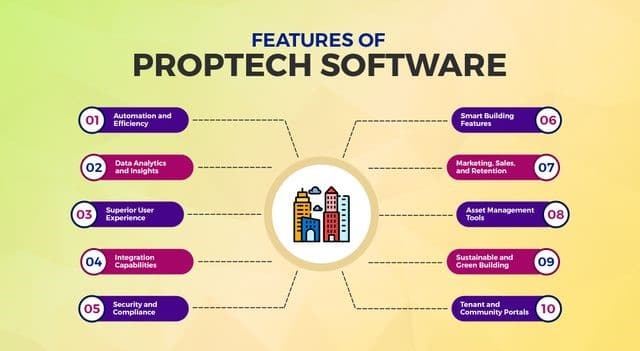
1. Automation and Efficiency
Workflow automation streamlines repetitive tasks like lease management, communications, and maintenance scheduling with efficiency and minimal intervention. Business process automation and artificial intelligence help achieve this target by replacing the toil with task automation.
2. Data Analytics and Insights
Real-time data monitoring provides analytics on real estate performance, market trends, and tenant behavior. Meanwhile, predictive analytics leverages AI and machine learning to forecast market trends, rental prices, and investment opportunities.
3. Superior User Experience
Virtual tours and 3D modeling allow potential buyers and renters to explore properties remotely through VR and 3D visualization. Mobile accessibility via apps for property search, management, and communication ensures convenience anytime, anywhere.
4. Integration Capabilities
Seamless integrations with internal or external systems help manage onboarding and conversion. The system must offer API integrations to connect with third-party platforms for optimal functionality, including payment gateways and social media.
5. Security and Compliance
Data security is a challenge demanding the implementation of encryption protocols, secure data storage, and compliance with data protection regulations. The application must offer tenant screening tools for thorough background and credit checks, let alone strong access controls.
6. Smart Building Features
IoT integration for energy management, resource allocation, and predictive maintenance enables smart homes and smart buildings. IoT devices, networks, and monitoring allow for remote access and control of several attributes, like lighting, temperature, water levels, and energy supply.
7. Marketing, Sales, and Retention
Tools for capturing, tracking, and nurturing leads through marketing automation and campaigns sanction effective marketing plans. Data analytics and bespoke advertising encourage potential buyers to take desirable action and convert quickly. Loyalty programs and credibility scores might help retain profitable clients longer while encouraging them to repurchase.
8. Asset Management Tools
Real Estate asset management software comprises portfolio management tools for managing and analyzing real estate portfolios. It also integrates with financing and crowdfunding platforms, facilitating real estate investing through different sources for small as well as large investors.
9. Sustainable and Green Building
Energy management systems monitor and optimize energy consumption in buildings, most of which include renewable energy sources. Sustainable building practices include modern green building technologies and reusable materials to reduce environmental impact.
10. Tenant and Community Portals
Tenant portals provide them to compare, choose, and manage their leases, make payments, and request maintenance. Community forums enhance community engagement within residential and commercial properties for peer support and guidance.
Evolution of the Real Estate Industry
Despite reaching the current levels of automation and digitalization, the evolution of the industry is not going to stop. With the rise of proptech companies and solutions, current trends are moving towards a sustainable future. However, it is equally necessary to discuss the future proptech and real estate prospects for a better understanding.
The Rise of Proptech
The digital transformation and automation of real estate operations gave rise to Proptech. Innovations such as property management software, CRM systems, and real estate investment software became prevalent. It further strengthens with the incorporation of IoT systems in home automation and smart buildings for efficient resource consumption.
VR and AR technologies enable immersive property tours and advanced visualization techniques for buyers and investors. Meanwhile, commercial real estate software is helping businesses offer and manage co-working spaces effectively. Together, all these solutions aim to create a cohesive and convenient experience for users, including tenants, owners, builders, brokers, and investors.
Current Trends
Environmental concerns and regulations drive the increasing focus on sustainable green building practices. The flexible workspaces and remote work facilities further contribute to lessening fuel consumption and pollution. Commercial real estate property management software allows the sharing of offices within multiple teams and shifts for optimal resource allocation.
Big data analytics and artificial intelligence are aiding in predicting market trends, optimizing property management, and personalizing customer experiences. Further, AI, BIM and Contech are bringing teams closer for collaborative design and cohesive construction. Robotics and 3D printing allow builders and developers to construct faster or install prebuilt components on-site.
Future Directions
Future proptech technologies are going to be more impactful, client-centric, and highly profitable for investors. The ever-increasing demand for housing and commercial property will continue on an upward trajectory with minimal chances of slowing down. Therefore, it is crucial to study the key factors impacting its projections in the near future, which are as follows:
a) Blockchain Development
Blockchain technology will transform property transactions by enhancing transparency, reducing fraud, and streamlining processes via smart contracts. The self-executing agreements are integral to Blockchain solutions, which include certain rules and functions.
b) Enterprise App Integration
EAI is a full integration of enterprise-wide applications and fusion of cutting edge technologies like AI, machine learning, and IoT empower solutions. They enhance performance with efficiency, allowing firms to expand and serve wider audiences and become a real estate ERP system.
c) Urbanization and Smart Cities
Ongoing urbanization will drive the development of smart cities, adding technologies to improve infrastructure, transportation, and living conditions. Communities would be safer, more efficient, and eco-friendly by optimizing resource consumption and responsibly choosing raw materials.
d) Automated Valuation Models (AVMs)
An AVM adopts the mathematical or statistical modeling approach to determine property value as per current transactions in the market. It usually comprises large data sets that contain specific details of properties and their buying/selling values, where algorithms extract information.
e) Crowdfunding and Tokenization of Assets
Crowdfunding platforms and the fractionalization of real estate assets allow for a larger number of small investors to pool and invest. It divides up expensive properties into smaller shares so that investors can buy percentage ownership and claim profits accordingly.
The Latest Proptech Trends in Focus
The Proptech industry is continually growing, with new trends emerging as technology advances and market demands shift. Here are some of the latest Proptech trends that you might consider investing in.
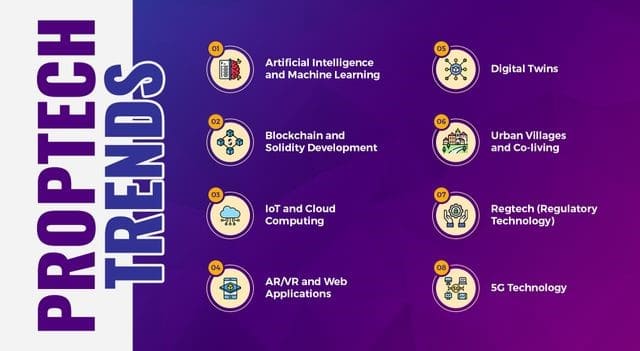
1. Artificial Intelligence and Machine Learning
AI and ML are at the heart of predicting market trends, property values, and customer demands, helping professionals make data-driven decisions. They empower industrial or public portals by finding the right option, let alone enhancing customer services or property recommendations.
2. Blockchain and Solidity Development
Blockchain technology ensures transparent and secure property transactions, reducing fraud and building trust. Solidity development automates contract execution, ensures compliance with favorable terms, and streamlines the buying, selling, or leasing processes.
3. IoT and Cloud Computing
IoT devices such as smart thermostats, lighting systems, and security cameras are increasingly becoming common in residential properties. Migrating building management systems to the cloud platforms enables remote monitoring, control, convenience, and accessibility.
4. AR/VR and Web Applications
AR VR apps not only offer immersive virtual tours of properties but also allow professionals to collaborate on projects. Web applications enable individuals using different devices to access, add, or process data for cohesive progress. In addition, AR VR helps in interior design and décor.
5. Digital Twins
Digital twins or virtual replicas of buildings and infrastructure help to simulate, monitor, and optimize performance in real time. Together with the AI tools, they aid in predictive maintenance and preventive decisions, reducing downtime, failure risks, and repair costs.
6. Urban Villages and Co-living
Cities with the densest populations are experiencing a rise in co-living spaces that offer shared amenities and a sense of community. In contrast, urban villages are small settlements with closer access to amenities, where communities reside and earn within the same vicinity.
7. Regtech (Regulatory Technology)
Compliance with standards, tax, and legal regulations requires continuous vigilance and timely intervention. Compliance automation tools help real estate businesses adhere to regulations and perform rigorous tenant screening to avoid disputes or legal penalties.
8. 5G Technology
The rollout of 5G technology is improving connectivity and enabling faster IoT applications in real estate. Smart cities and industries are initiating a new development era with safer infrastructure, vigilant monitoring, and high-end urban planning.
Unique Software Development for You
With all the types, features, implications, and future trends of Proptech in consideration, the next step is finding a custom development firm. The best proptech companies are not the ones that solely have experience in the field but those that offer a myriad of services. For reference, the following diverse services of Unique Software Development make it the best Proptech company.
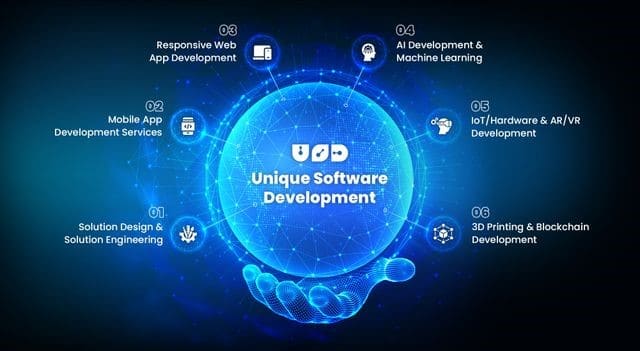
1. Solution Design & Solution Engineering
Whether you need proptech software development or proptech consulting, we have the best solution architects, designers, and engineers for you. We analyze business challenges for smart solutions that perfectly align with your business model and user preferences. Once the tech stack and final objectives are ready with us, you might request its development or save it for later use.
2. Mobile App Development Services
As smartphones are becoming mainstream, a proptech app is an ideal way to stay connected with prospects, tenants, or potential investors. It keeps you up-to-date on the latest trends and available deals while also providing insights into the proptech market. Being one of the top proptech companies, we offer native, cross-platform, and hybrid mobile app development services for iOS, Android, and other platforms.
3. Responsive Web App Development
A web app is a favorable choice, especially when you have a large pool of tenants, prospects, or investors. We have the best web app developers ready to take on your challenges and transform them into opportunities with responsive web app development. If you are an agent, broker, fund manager, portfolio manager, repair/maintenance provider, or investor, all you need is a web app.
4. AI Development & Machine Learning
Be it the management of transactions, databases, lead generation, or real estate development, AI and ML drive optimal results. AI systems have the capability to automate, regulate, and elevate your real estate software solutions for maximum performance. We automate your procurement, operations, accounting, marketing, and sales processes, unifying all as a real estate ERP software. We offer premium machine learning and AI development services for enhancing proptech apps.
5. IoT/Hardware & AR/VR Development
Being a leading real estate software development company, we have top professionals for IoT development and AR/VR development. They empower us to embed modern, high-tech, remotely controllable features into your software while saving significant cost and time. Our IoT systems and AR/VR apps let you monitor and manage smart buildings with immersive AR VR experiences.
6. 3D Printing & Blockchain Development
Unlike other real estate software companies, we offer scalable 3D printing services for modeling, prototyping, and even building structures. It gives you the advantages of selecting eco-friendly materials, building on-site, controlling multiple projects, and preventing wastage. In contrast, we develop Proptech DApps with Blockchain and solidity development for crowdfunding, tokenizing, and managing digital wallets.
Conclusion
Proptech is a modern term that refers to the pool of the best real estate software solutions. You might use them for any activities ranging from construction and operations to asset management or marketplaces. The blog covers all the types, features, trends, and future potential of Proptech for your reference and as a source of inspiration. Investing in a technology solution grants you wider access to the mass audience and a higher return than most real estate investments.
Unique Software Development has deep knowledge, high expertise, and wide experience in Proptech software development. Besides custom software and mobile applications, our diverse services include Blockchain, IoT, AI, machine learning, AR, and VR development. Consult us for your proptech business ideas or enterprise solutions to grow way beyond your goals.

